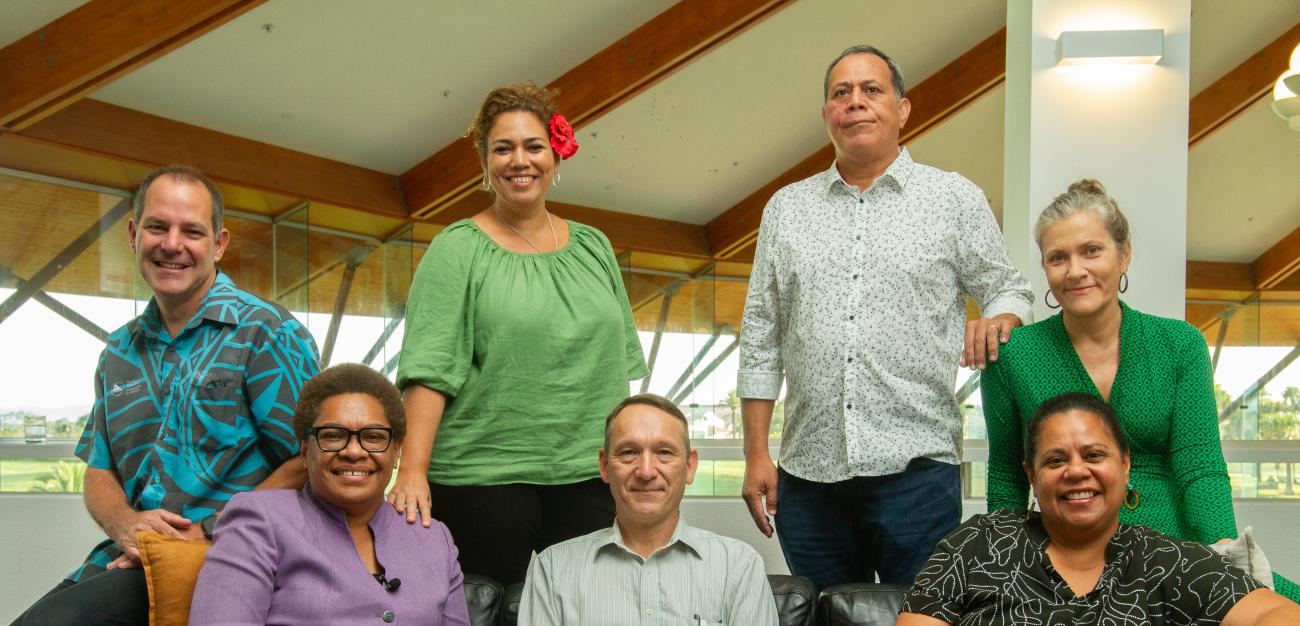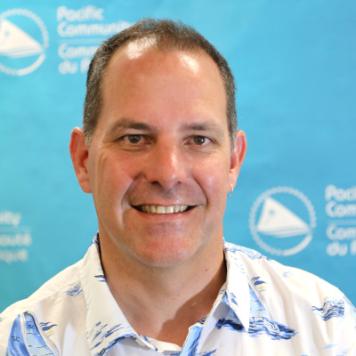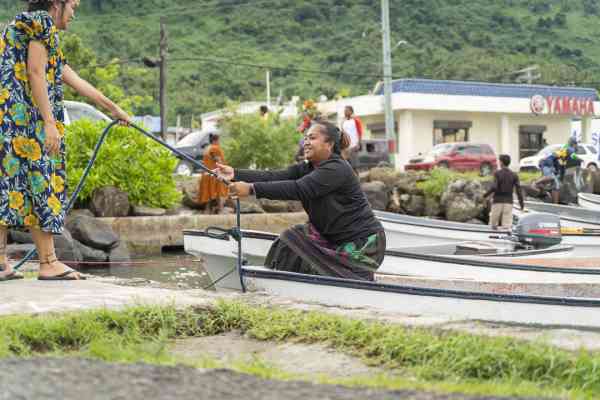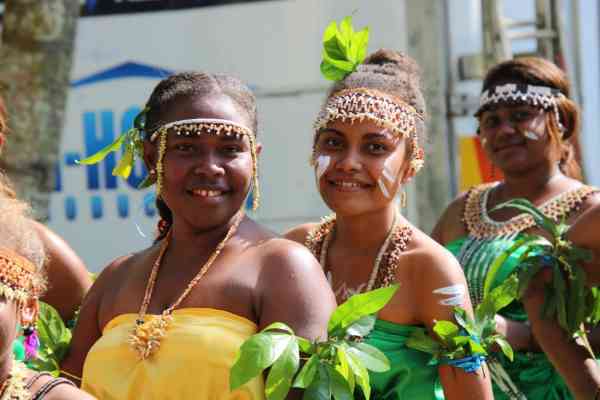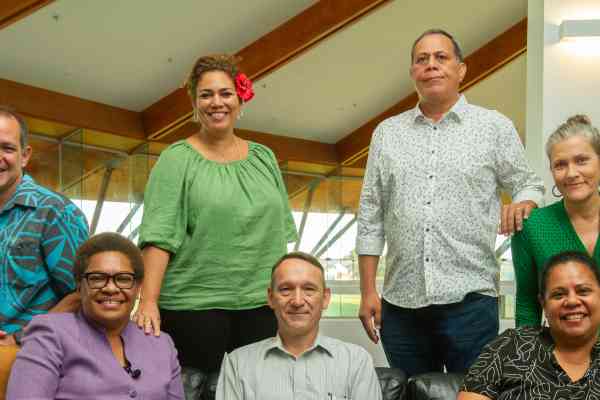Photo: This International Women’s Day directors from several SPC divisions joined a Panel Discussion, as part of the ‘One-SPC Event for International Women’s Day’. Credit: SPC
On International Women’s Day we celebrate the achievements of women but we also take time to reflect on progress made, and re-double our efforts to address the challenges ahead.
"We want a Pacific where women and girls are safe and equitably share in resources, opportunities and decision-making with men and boys”.
At SPC, we do this as a team, women and men from different divisions working together towards a common goal – we want a Pacific where women and girls are safe and equitably share in resources, opportunities and decision-making with men and boys. This International Women’s Day, we’re highlighting the broad range of gender equality programming across SPC − their positive effects and challenges.
We know that when women are supported with equitable opportunities it benefits our people as well as our environment. Examples of this range from a solar boat project in Fiji changing mindsets around traditionally male-oriented roles, to targeted Pacific training increasing women leaders in the health sector, and agriculture’s organic value chains work in Palau advancing women farmers from the taro patch to the policy table. These examples are detailed below.
“Everyone benefits from gender equality.”
Everyone benefits from gender equality. However, it requires dedicated work and commitment to provide equitable opportunities for women – not just equal numbers of women and men in a workshop, but making sure women's voices contribute to decision making and resulting opportunities, just as easily as men can.
With an unequal distribution of unpaid care work and gendered societal expectations – change is not easy. There’s no magic bullet or quick fix. But there are key points in time where we can reflect and recommit ourselves to progress all Pacific peoples’ rights and well-being through science and knowledge, guided by our deep understanding of Blue Pacific contexts and cultures.
This International Women’s Day we celebrate women across the Pacific – and globally – for their dedication over generations to work toward a Pacific where all people, both women and men, can participate equally in all aspects of life. We celebrate the social, economic, cultural, and political achievements of women. While we reflect on progress made, we also need to acknowledge the challenges ahead that still limit the ability of women and girls to access services, to make decisions in their homes and communities, and to be equal alongside men to work together to make this the best Pacific it can be.
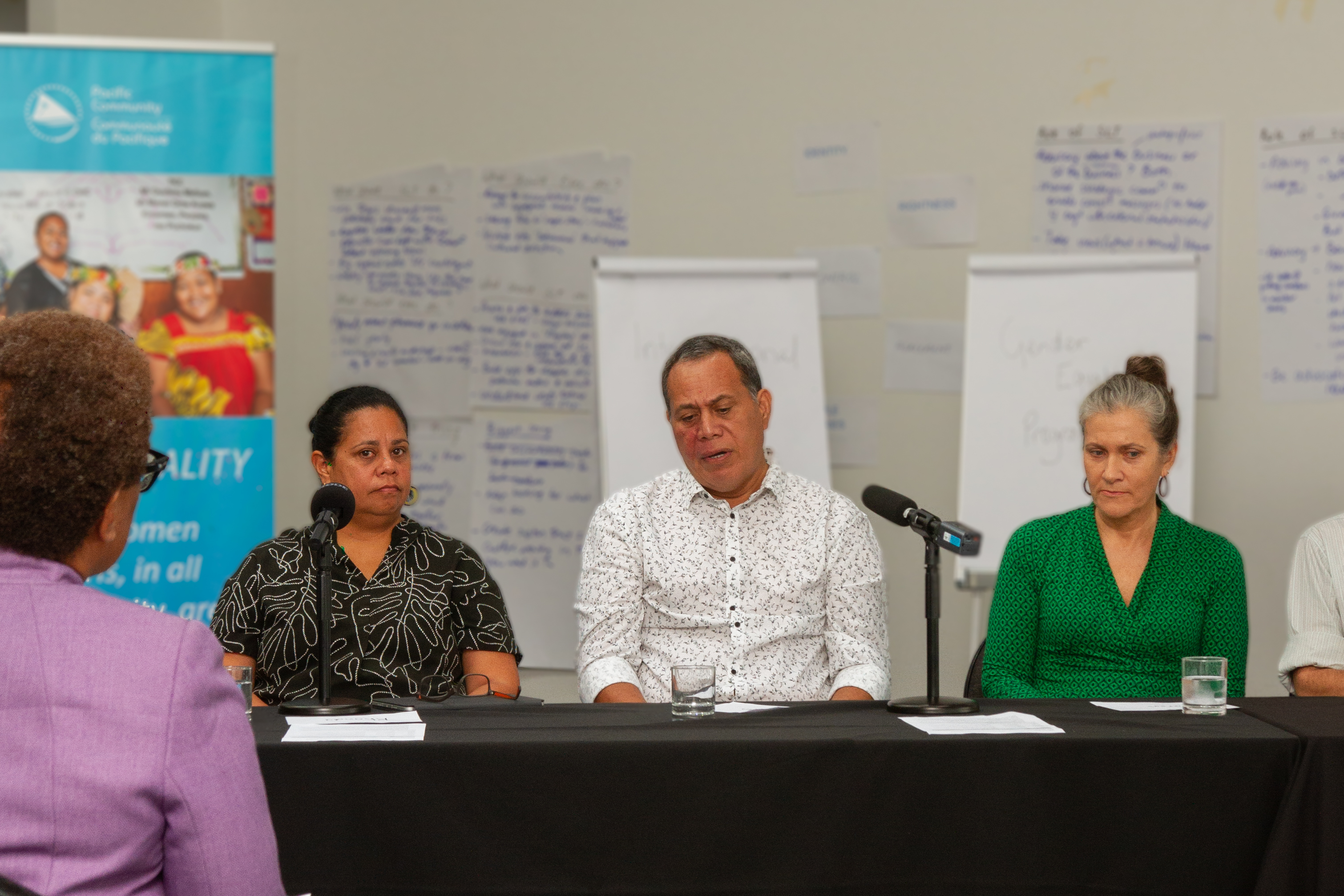
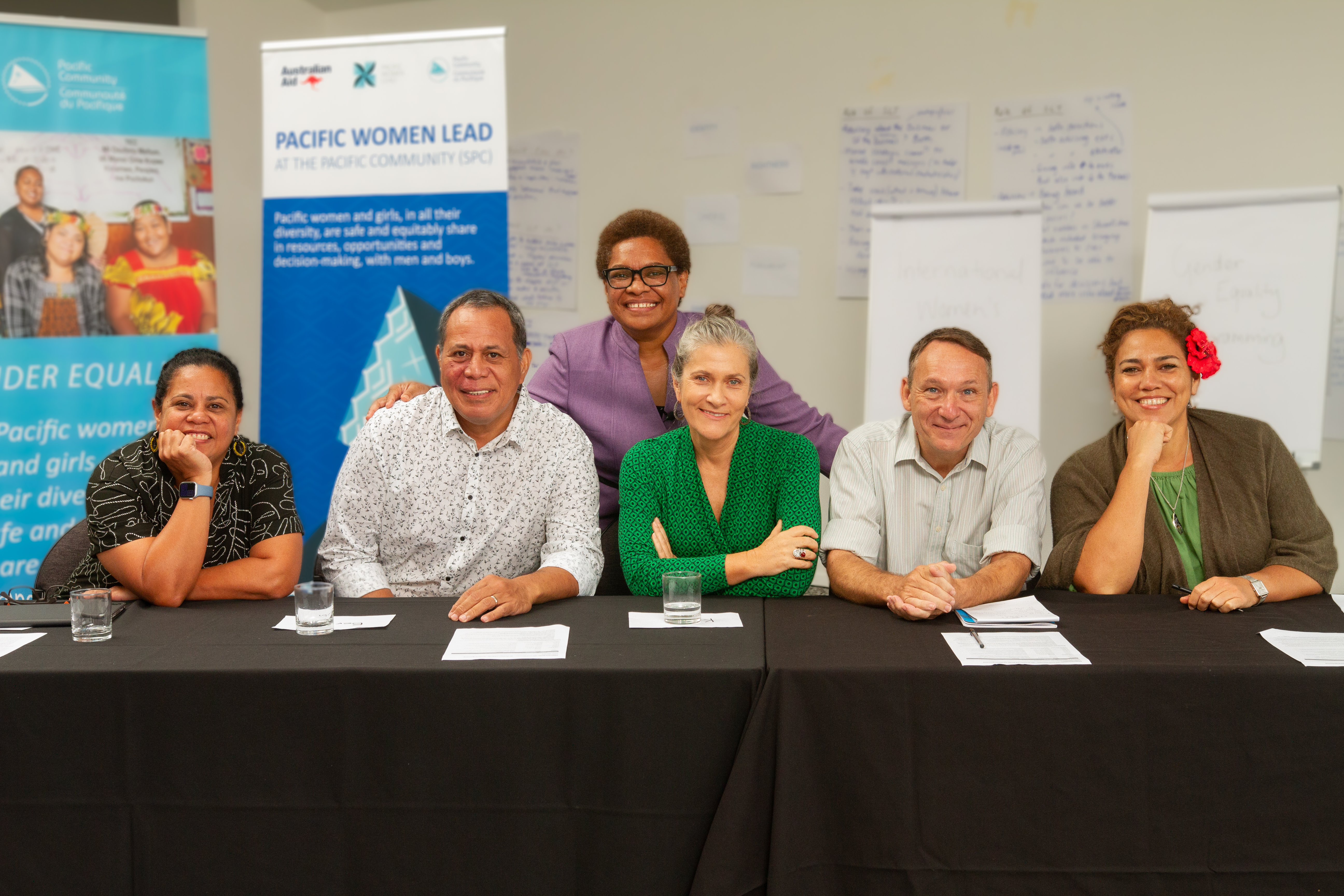
Gender equality embedded in programming
SPC is committed to improving gender equality, women’s empowerment and ending violence against women and girls. But it won’t happen on its own, and we each have a role to play.
By working with government, civil society, faith-based organisations and other partners across the Pacific region, SPC is ensuring gender equality is integrated into the way we work, across our broad range of divisions and community programmes.
Whilst the heart of SPC’s gender programme lies within its Human Rights and Social Development division, the reach of gender equality work is across every division and project. This is because gender equality doesn’t exist in a silo, but cuts across every sector of our economy and society.
SPC is working hard to ensure gender equality is integrated across its work – here are some examples.
Gender data and statistics
SPC continues to be a leader in gender statistics and data development, working with partners across the Pacific who increasingly include data-based gender and social inclusion analysis to integrate gender considerations into national sustainable development plans, priorities and implementation.
SPC’s Progressing Gender Equality in the Pacific (PGEP) programme, Statistics for Development and Human Rights and Social Development divisions are using gender statistics, data and research to drive change and improve gender equality.
Robust data and research can be used to advocate for key issues such as ending violence against women and girls – as evidence to push for needed legal protection, more support services, referral pathways and resources, and increased funding for dedicated programmes. For example, soon after the release of the National Study on Domestic Violence against Women in Tonga, the Family Protection Act was passed.
You can visit SPC’s Pacific Data Hub for free access to Pacific gender data and statistics, or SPC’s Toksave Pacific Gender Resource for the latest in gender research.
Equity in agriculture
Agriculture is essential for the livelihoods of many Pacific communities, making it an important platform to advocate for gender equality and to celebrate the contribution of women.
SPC’s Land Resources Division has a growing number of gender equality initiatives. In Palau, SPC’s Pacific Organic and Ethical Trade Community (POETCom) is supporting Palau women to cultivate success from the taro patch to the policy table, leveraging traditional knowledge from generations. POETCom’s Building Prosperity for Women Producers, Processors and Women Owned Businesses through Organic Value Chains (BPWP) project is assisting a women’s group in Palau to make and sell ‘demok’ (cooked taro leaf) that is vacuum packed and frozen to sell in stores – a profitable value-add to a commodity item. Support includes organic certification, women-friendly equipment and other interventions resulting in a changing role for women as entrepreneurs in the agriculture sector and innovators who are expanding value chain opportunities.
New for BPWP is its Gender and Organic Value Chains Analysis Toolkit which will be used for regional and national training, including Training of Trainer (ToT) sessions. In 2022, the BPWP conducted capacity development of 192 individuals, including 122 women, through training and workshops targeted at strengthening engagement in organic agriculture and the Participatory Guarantee System (PGS).
Women’s leadership grows in the oceans, maritime and fisheries sectors
Of the 16,000 people working in the Pacific maritime sector only 11 per cent are women – that’s 1 in 10.
Maritime is one of the Pacific's most important sectors and SPC is committed to ensuring all people – women and men – have an equal opportunity to contribute to growing, nurturing and developing our ocean life. Instrumental in this role is the Pacific Women In Maritime Association (PacWIMA), supported by SPC and with 10 state-led associations in Fiji, Cook Islands, Kiribati, Nauru, Papua New Guinea, Samoa, Solomon Islands, Tonga, Tuvalu and Vanuatu.
It was SPC that encouraged PacWIMA in 2016 to lead an initial campaign to introduce the first Day for Women In Maritime in 2019 – 2021 in the Pacific. This strong mobilisation ignited the global maritime community, especially at the International Maritime Organization (IMO) General Assembly in December 2021, recognising 18 May as the International Day for Women in Maritime. It is now an annual, global event.
While thinking global, SPC also retains a significant focus on small communities such as Fiji’s Nakalawaca village. The village has doubled the productivity of local fisher women while also changing villagers’ mindsets to realise many women are highly skilled boat operators. SPC, through MTCC-Pacific (Maritime Technology Cooperation Center in the Pacific), halved the time and cost of fishing for the village women by providing a solar-powered boat along with the opportunity for women to undergo the Boat Master Licence training. This required changes to village protocols and a long-term engagement with the community, which has witnessed this change.
The Fisheries, Aquaculture and Marine Ecosystems division is also contributing to the empowerment of women. Evidence indicates more women are being included alongside men community leaders, government officials and other stakeholders who make decisions about how fisheries resources are managed along Pacific coastlines. The community-based fisheries management (CBFM) initiatives are aggregating the many, small CBFM ‘pockets’ – termed ‘scaling-up’ – on a national or regional basis to create a large collective of people able to share learnings, work together to sustainably manage their resources.
CBFM is implemented by SPC through the Locally Managed Marine Area (LMMA) Network, which is part of the broader Pacific-European Union Marine Partnership (PEUMP) Programme funded by the European Union (EU) and the Government of Sweden and implemented by several regional and international organisations.
Climate change approaches integrate gender
SPC’s Climate Change and Environmental Sustainability division, for which women account for almost two-thirds of staff, is supporting gender equality programming in two key ways. Firstly, through discrete activities with outcomes focused on empowering women. Secondly, with mainstreaming gender equality at an institutional level through climate financing; and through the development of SPC’s first ever Social and Environmental Responsibility (SER) Policy.
Collectively this helps to ensure gender equality is mainstreamed into all aspects of climate finance project cycles – from development, management, implementation and in its results reporting. Further, that gender equality is mainstreamed into all aspects of SPC’s activity, staffing and procurement, well beyond just climate financeable activities.
Women as health leaders
SPC is also contributing to the change in the health sector to have more women in senior leadership roles. In the past decade, there has been a significant increase of 18 per cent in female doctors. This reflects the changing Pacific landscape for women in health as professional development opportunities increase, along with support to governments ensuring their national plans and regional commitments achieve equal opportunities for women.
Through SPC’s Public Health Division, over the past five years 64 per cent of training opportunities funded by SPC are for women. We are witnessing more women in health, taking up opportunities to study further and specialise.
Improving the lives of diverse women and girls
SPC divisions are working to improve the lives of women and girls living with disabilities. In the North Pacific, SPC's Human Rights and Social Development Division has supported the advocacy campaign by the Kosrae Special Parent Network directly contributing to government adopting the Kosrae Disability Act. The Act improves the rights of people with disabilities, including the rights of survivors of violence against women and girls with disabilities to access support services – with research showing high rates of violence against Pacific women living with disabilities.
Work also continues to end gender-based violence for people who identify as having diverse SOGIE (sexual orientation, gender identity and expression) including through grant support from the Pacific People Advancing Change (PPAC) programme to the Tonga Leitis' Association.
Ending gender-based violence and empowering women and girls through education, improved agency and other approaches is a focus for several SPC programmes including Social Citizenship Education, Pacific Girl, Pacific Women Lead at SPC and other initiatives. This includes support to crisis centres, especially in the North Pacific where this work is changing mindsets. Ongoing technical support to counsellors and caseworkers at the Chuuk Women’s Council’s (CWC) Tongen Inepwineu Counselling Center (TICC) is resulting in TICC locally-led information sessions, with men now referring women relatives to the centre.
Gender responsive information and strategic services
While our staff are involved in significant gender equality work for community activities, it is important they are supported with gender sensitised services. The organisation’s information services team is ensuring gender equality approaches are weaved into the fabric of our organisational infrastructure and workplace culture. Information services continue to innovate new ways to attract women - who account for almost one third of the team (28 per cent) – while taking the opportunity to holistically examine the gendered impacts of innovation and technology and education in the digital age.
This reflects the priority theme for this year’s International Women’s Day of ‘Innovation for a gender equal future’ reflecting the theme of this year’s 67th Commission on the Status of Women (CSW) of ‘Innovation and technological change, and education in the digital age for achieving gender equality and the empowerment of all women and girls.’
SPC’s Strategy, Performance and Learning unit also provides significant support to all divisions across the organisation, particularly through its work leading the co-development of the SPC Strategic Plan 2022-2031, supported by the Committee of Representatives of Governments and Administrations (CRGA).
Through the CRGA, SPC members strongly advocated for the inclusion of ‘gender equality’ oriented language in the Strategic Plan including both Key Focus Area (KFA) 4 of ‘Equity, education and social development’ and KFA 7 for ‘Transforming institutional effectiveness’. Members also championed the inclusion of gender equality in SPC’s values, such as ‘Enginkehlap’ (generosity) that calls for the inclusion of all voices in our shared vision for the future.
Embracing regional and global commitments
Ensuring we include equitable approaches is critical for effective community and national programmes. It’s also important these programmes connect to regional commitments made by Pacific Island Forum Leaders and people of the Pacific, and also by SPC.
As the technical lead for the work on gender equality in the Council of Regional Organisations of the Pacific (CROP), SPC commits to convening the Triennial Conference of Pacific Women and the Pacific Ministers for Women Meeting. This connects with the Pacific Leaders Gender Equality Declaration (PLGED), the implementation of the Pacific Platform for Action on Gender Equality and Women’s Human Rights (PPA) and other global commitments such as the Beijing Platform for Action.
SPC is committed to improving gender equality, women’s empowerment and ending violence against women and girls.
Of course, none of this is possible without the support of donors and partners who lead and support these initiatives – too many to mention and including, but not limited to, the governments of Australia (DFAT), New Zealand (MFAT), Sweden (SIDA), United States of America (USAID) plus the European Union through the Delegation of the European Union for the Pacific, International Maritime Organization (IMO) and the Maritime Technology Cooperation Center in the Pacific.
Gender equality won’t just happen on its own. As One-SPC we commit to ensuring every programme we initiate, every community activity we do, and every team we put together considers gender as an integral part of its work.
Each one of us can take responsibility to create change towards achieving gender equality: at work in what we say and do, and how we treat each other; at home ensuring that we remove stereotypes in how we talk to our children and family; and that we equally share the household work and care burden.
No longer can we accept the narrative that gender equality is a “woman’s issue”. Gender equality is an issue for every woman and man, girl and boy. We each have a critical role to play and we can take personal responsibility for this role.
I wish you all the best this International Women’s Day, and every day as we work toward a more equal future.
